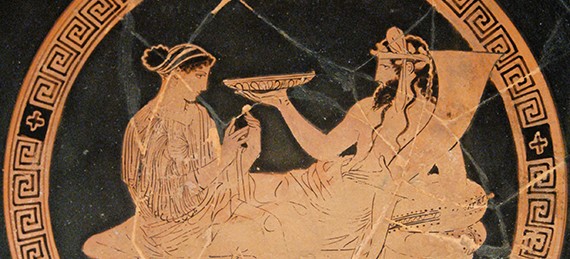By Sean Kelly, Managing Editor, Classical Wisdom
The myth of Persephone and Hades, that tale of shifting seasons, strangely remains evergreen.
Through the centuries, the story of the god of the underworld abducting the goddess Demeter’s daughter, resulting in Demeter’s winter-inducing depression, has endured as one of the most popular and continuously retold stories from the world of Greek myth.
Whether it’s the famous statue by Bernini, a host of novels and paintings, or storybook versions we remember from childhood, Hades and Persephone’s tale has been imprinted in our minds, earning its place of prominence in Greek mythology.
But have you ever wanted to understand this myth more deeply? Or better yet, have you wanted to go past all the retellings, and find your way to one of the original versions?
Let Helene Foley, Professor of Classics at Columbia University, and one of the world’s most renowned Classicists, be your guide.
Author of many books including Reimagining Greek Tragedy on the American Stage, Female Acts in Greek Tragedy, and Reflections of Women in Antiquity, Dr. Foley received her MA at Yale, her PhD at Harvard, and has also taught as a visiting professor at Dartmouth, New York University, and Berkeley.
So, it’s safe to say she is one of the world’s leading experts on Ancient Greece.
Her book, The Homeric Hymn to Demeter– Translation, Commentary and Interpretive Essays, focuses on one of the oldest written versions of the Hades and Persephone myth.

Coming directly from the religious festivals of Ancient Greece, it tracks this astonishing tale with a focus on Persephone’s mother, the goddess Demeter. All the key elements you already know are there – the abduction, the pomegranates, Hades’ kingdom…
But you also get a chance to discover the parts you perhaps aren’t familiar with – such as the mythical origins of the fascinating Eleusinian Mysteries.
Moreover, the poem and its analysis allow us to gain a key insight into the lives and psychological experiences of women in Ancient Greece.
The Poem was so highly thought of that the Greeks attributed it to Homer, whom they considered the greatest epic poet.
If you want to learn more about Hades, Persephone and Demeter, join us later this month for our Symposium. We will be discussing the End of Empires and Fall of Nations with a host of the world’s most celebrated thinkers on Greece and Rome.
This will also be your chance to see Helene Foley LIVE, speaking on “The Evolution of the Divine Empire”.
After discussing the divine evolution in Hesiod’s Theogony, Dr. Foley will turn to Demeter’s challenge to the divine and human world over the unwilling abduction of her daughter Persephone by the god of the underworld Hades. Her evolution involves a modification of divine marriage among the gods and the promise of a better life and afterlife for humans.
Discover divine empires on August 21/22 at this year’s Symposium 2021: The End of Empires and the Fall of Nations.
Get your tickets NOW












No comments
Trackbacks
Our apologies, you must be logged in to post a comment.